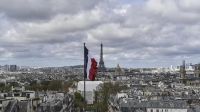About 3,500 detainees who will be released from the camps if Greece’s new anti-austerity rulers make good on their promises – to the consternation of both Greeks and the EU
Inside the barbed wire and fences at the Amygdaleza camp, undocumented migrants of all ages wander around the yard, tending to clothes hanging to dry outside shipping containers.
The Athens detention centre, at the foot of Mount Parnitha’s lush fir forest and a few minutes’ drive from the country’s oldest casino, is among seven migrant centres across Greece. Its occupants are among about 3,500 detainees who will be released from the camps if Greece’s new anti-austerity rulers make good on their promises.
For people like Bilal Hussein, it cannot come too soon. He was held in various detention centres in Greece, including the now notorious Amygdaleza. “It was horrible,” he recalls.
When the 34-year-old was released at the end of last month in the northern town of Xanthi, he was still wearing his summer clothes from the time he was arrested last year. “It was cold but we had nothing to wear, only a T-shirt and trousers – not even socks.”
Mr Hussein fled his home town of Sialkot in Pakistan nine years ago. He had begun a relationship with a woman whose family were outraged that they were not married. His girlfriend was murdered by her own family. He fled and sought sanctuary in Europe. But life in Greece, he said, has been “worse”. He says he watched many inmates die from illnesses because of neglect and the lack of any healthcare at Amygdaleza.
“The [camp] was very dirty. If anyone got sick, no one cared – we’d get beaten up when we asked for a doctor,” he tells The Independent. Other migrants also talk of widespread physical abuse in Greece’s detention centres. For years, Athens has repeatedly been condemned for the treatment of migrants by the European Court of Human Rights.
In its recently published report after visiting Amygdaleza in February, the NGO Médecins du Monde (MDM) lamented the poor living conditions but noted there was no evidence of violence. “It was really the image of a concentration camp,” the head of Greece’s branch of MDM, Nikitas Kanakis, said.
Mr Kanakis, who has been working for MDM for more than 20 years covering all major crises and wars around the world, said the residents at the camp were “neglected, malnourished and living in isolation without even knowing what the future held for them”. He cites as an example the day his NGO visited; it was snowing, yet some immigrants were still wearing the clothes they were wearing when they were arrested last summer – just like Mr Hussein.
Left-wing Syriza swept to power vowing to break with the policies of the past, and wants to free about 20 migrants every day, while ensuring the safe housing of 210 unaccompanied minors who are spread around the country’s camps. The government wants to shut down the camps gradually or transform them into open reception centres. “There is a huge change in our government policy,” Tasia Christodoulopoulou, the Immigration Minister, tells The Independent. “We want to bridge the chasm between safety and freedom.”
But her opinion is not widely welcomed in a country that has become one of the main gateways into Europe for hundreds of thousands of migrants from North Africa and Asia, especially Syrians.
The Athens Mayor George Kaminis said: “We do not agree with this procedure, where hundreds of people are transported downtown [in Athens] without any concern about where they’ll stay, eat, or survive.” Ms Christodoulopoulou says that she’s started a debate in Europe, urging other countries to start taking on a greater share of responsibility for the unprecedented rate of migration. Greece’s stretched resources, infrastructure and bureaucracy means many applications are stymied. And refugees are denied their rights while Greece is flooded with asylum-seekers it cannot handle.
With its hundreds of islands, Greece has one of the longest coastlines in Europe, making it an attractive option for illegal immigrants. Meanwhile, neighbouring Turkey has been faced with a huge refugee crisis with hundreds of thousands of Syrians hoping to enter Europe.
Ms Christodoulopoulou says she has urged the EU to take its share of responsibility, a sentiment widely shared in the debt-saddled country, because “we are under greater pressure than the countries of the north”.
But Greece’s immigration policy is also being used by senior ministers as a pressure tool abroad. Due to its position on the south-eastern tip of Europe, one of the main points of entry for illegal immigration to the EU is Greece’s border with Turkey – a country that jihadists travel through to enter the Isis territories of Iraq and Syria.
Last month, Panos Kammenos, junior coalition party leader and Defence Minister, told a meeting of the right-wing Independent Greeks party that his government would suspend European treaties, allowing immigrants to move to the rest of the Continent.
“If, among these immigrants, some have crossed to the side of Isis and that hasn’t been checked, then the responsibility will lie with Europe,” he warned as Greece negotiated its debt repayments with Brussels.
This prompted anxiety throughout Europe and even across the Atlantic. But Ms Christodoulopoulou rejects her colleague’s efforts to pressure Europe into cutting Athens some fiscal slack. “Immigration policy cannot become a tool of negotiation,” she says. She says her ministry will start freeing foreigners whose only crime is “to have illegally crossed into Greece”.
Source: The Independent









